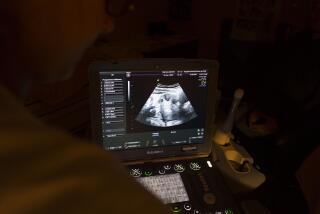Blood From Mothers Used in Fetal Tests
- Share via
Raising hopes that a simple maternal blood test could replace amniocentesis and other invasive techniques, UC San Francisco researchers have accurately diagnosed two fetuses at risk for genetic disorders by analyzing the mothers’ blood.
Reporting in Thursday’s issue of Nature Genetics, the scientists said they were able to test for single-gene disorders by isolating and studying fetal cells in the mothers’ samples.
Single-gene disorders include such common diseases as sickle cell anemia, Tay-Sachs disease and cystic fibrosis. More than 100 genes have already been identified for various inherited disorders, and the number is growing.
The findings build on a previous success by other researchers in identifying chromosomal disorders, such as Down’s syndrome, from maternal blood. Combined, the research increases the possibility that maternal blood samples might replace amniocentesis and chorionic villi sampling to identify fetuses with genetic disorders.
Both amniocentesis and CVS are costly, invasive procedures that carry a slight risk of miscarriage. Prenatal diagnosis from maternal blood, however, bears no such risk and can probably be done earlier in the pregnancy.
“This is the first example of the accurate use of fetal cells in maternal blood for the noninvasive diagnosis of single-gene disorders early in pregnancy,” said Dr. Bob Williamson of the Royal Children’s Hospital in Australia in an editorial accompanying the paper. “If the procedure can be adapted for use in routine diagnostic laboratories, it should remove one of the major remaining concerns of women whose pregnancies are at risk--the possibility that CVS or amniocentesis could cause a spontaneous abortion, resulting in the loss of a normal pregnancy.”
The risk of a miscarriage caused by amniocentesis or CVS is extremely small, from 1% to 2%, according to most estimates. Nevertheless, both tests involve minor surgical procedures that require a high degree of skill on the part of the technician and cause some discomfort to the pregnant woman.
For these reasons, scientists have eyed maternal blood as a potential alternative method to obtain fetal DNA. Researchers have long known that fetal cells occasionally leak into the mother’s blood, possibly through the placenta, and could, theoretically, be extracted and analyzed for their genetic makeup--perhaps as early as the eighth week of pregnancy.
Progress has already been made by several groups in identifying fetal chromosomes from maternal blood. In 1994, the National Institute of Child Health and Human Development launched a major project, involving 3,000 women, to study the use of maternal blood tests in screening for chromosomal defects. These defects occur more frequently in women over 35.
Identifying single genes from a fetus has proved technologically daunting. But, said Dr. Yuet Wai Kan, co-author of the new findings: “What we’ve done is to show this is feasible. Depending on whether we can now streamline this process and make sure it is accurate, then I think it could replace many cases requiring amniocentesis or CVS.”
Researchers have struggled with prenatal diagnosis from maternal blood because of the difficulty of isolating a pool of fetal cells pure enough for genetic analysis.
“The number of fetal cells that leak into the mother’s circulation is very small--only one cell out of many millions,” said Kan, a UC San Francisco professor of hematology and a Howard Hughes Medical Institute investigator.
His group solved this dilemma by applying specific antibodies to the sample that react with a particular kind of fetal cell, a red blood cell containing a nucleus called an erythroblast. Next, the group employed a technology called magnetic activated cell sorting to further isolate fetal red blood cells.
To finally isolate pure fetal cells, researchers placed the sample on a slide under a microscope and plucked out 20 of the cells one by one, Kan said.
In one case, the parents were carriers of beta thalassemia, a type of anemia common in people from the Mediterranean region. The genetic analysis showed the fetus was normal. The fetus in the second case also proved to be disease free, even though the parents carried the genes for sickle cell anemia. Both results were confirmed by CVS.
“We still need [more research] to establish a success rate,” Kan said.





